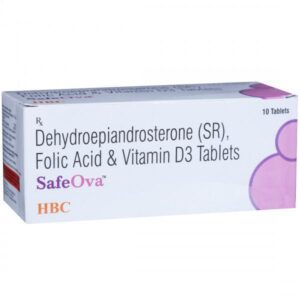FOLIC ACID + VITAMIN D3 IP + DEHYDROEPIANDROSTERONE CAPS
Folic Acid: Folic Acid, also known as vitamin B9, is a water-soluble vitamin that plays a vital role in DNA synthesis, red blood cell production, and cell growth. It is commonly prescribed as a supplement to prevent or treat folic acid deficiency and certain types of anemia.
The primary mechanism of action of folic acid is its involvement in the synthesis of DNA, amino acids, and certain neurotransmitters. It acts as a coenzyme in various metabolic reactions, including the conversion of homocysteine to methionine. Folic acid is also necessary for the proper development of the neural tube in pregnant women, which is crucial for the formation of the baby’s brain and spinal cord.
Folic acid is available in various forms, including tablets, capsules, and as an ingredient in multivitamin supplements. The recommended daily dose varies depending on the individual’s age, sex, and health condition. For adults, the typical dose for the prevention of deficiency is 400-800 micrograms (mcg) per day, while pregnant women may require higher doses (usually 600-800 mcg per day). It is important to follow the dosage instructions provided by the healthcare professional or as indicated on the product packaging.
When taken as recommended, folic acid is generally considered safe with minimal side effects. However, some individuals may experience mild side effects such as nausea, bloating, gas, and a bitter or bad taste in the mouth. In rare cases, allergic reactions may occur, characterized by symptoms like rash, itching, swelling, dizziness, or difficulty breathing. If any severe side effects or allergic reactions occur, medical attention should be sought immediately.
It is worth noting that folic acid supplementation may interact with certain medications, such as methotrexate, phenytoin, or sulfasalazine, potentially reducing their effectiveness or increasing the risk of side effects. Therefore, it is crucial to inform healthcare professionals about all medications and supplements being taken to avoid potential interactions.
Overall, folic acid is a crucial nutrient that aids in various biochemical processes in the body, especially in DNA synthesis, red blood cell production, and fetal development. It is widely available and is commonly prescribed or recommended by healthcare professionals to prevent or treat folic acid deficiency and related conditions.
Vitamin D3 Ip: Vitamin D3 IP, also known as cholecalciferol, is a form of vitamin D that is essential for the body’s overall health. It is commonly used as a dietary supplement to treat or prevent vitamin D deficiency.
The primary mechanism of action of vitamin D3 is its role in maintaining normal levels of calcium and phosphorus in the blood. Vitamin D3 helps in the absorption of calcium from the intestines and promotes its deposition in bones, which is crucial for maintaining their strength and structure. It also plays a role in regulating the immune system and promoting healthy cell growth.
The dosage of vitamin D3 IP varies depending on the individual’s age, health condition, and the severity of the deficiency. It is usually recommended to take vitamin D3 supplements with a meal to enhance absorption. The usual recommended daily dose for infants and children is 400-1000 international units (IU), while for adults it is 1000-5000 IU. However, the specific dosage should be determined by a healthcare professional.
Vitamin D3 IP is generally safe when taken in recommended doses. However, excessive intake can lead to an overdose, causing symptoms such as nausea, vomiting, loss of appetite, constipation, weakness, or confusion. Long-term excessive dosages can also lead to high levels of calcium in the blood, which can contribute to kidney stones and other complications.
Some individuals may experience allergic reactions to vitamin D3 IP, characterized by symptoms such as rash, itching, swelling, severe dizziness, or trouble breathing. If any of these side effects occur, medical attention should be sought immediately.
It is important to note that vitamin D3 IP should be taken under the guidance of a healthcare professional, especially for individuals with pre-existing medical conditions or those taking other medications. It is always recommended to consult a healthcare professional before starting or modifying any supplement regimen.
Dehydroepiandrosterone Caps: Drug Name: Dehydroepiandrosterone Capsules
Use: Dehydroepiandrosterone (DHEA) is a hormone produced by the adrenal glands. It is converted in the body to various sex hormones, such as estrogen and testosterone. DHEA capsules are used as a dietary supplement to increase the levels of DHEA in the body. It is often marketed as an anti-aging supplement and is believed to have various potential health benefits.
Mechanism of Action: The exact mechanism of action of DHEA is not fully understood. It is thought to interact with various receptors in the body, including androgen and estrogen receptors. DHEA may also play a role in the synthesis of other hormones in the body.
Dose: The recommended dose of DHEA capsules may vary depending on the individual and the desired effect. Typically, doses range from 25 mg to 50 mg per day. However, it is important to note that DHEA is a hormone and should only be used under the supervision of a healthcare professional. The dose should be determined based on an individual’s specific needs and health condition.
Side Effects: DHEA is generally considered safe when taken at appropriate doses, but it may cause certain side effects. Common side effects include oily skin, acne, hair loss or growth, facial hair growth in women, changes in menstrual cycle, fatigue, and mood swings. Long-term use of high doses of DHEA may also lead to liver toxicity, alterations in cholesterol levels, and hormonal imbalances.
It is important to note that DHEA supplementation is not recommended for everyone, especially individuals with hormone-sensitive conditions such as breast, ovarian, or prostate cancer. It may also interact with certain medications, including hormone replacement therapy and medications that are metabolized by the liver. Therefore, it is essential to consult a healthcare professional before starting DHEA supplementation to assess its suitability and potential interactions.

